Late September, 2017, and I’m sitting at a long dining table, across from Sally Khan, playing Rummy 500. She loves to play cards. This place, a two storey concrete structure, belongs to Sally and husband Faiz, and is situated on the main road in Biche, a mountain village nestled in a huge area of tropical rainforest in east-central Trinidad. The living area occupies the entire second floor, an open concept of kitchen, dining room, living room, with the bedrooms and bathrooms down hallways on either side. There is a wood deck off back patio doors, with an outdoor dining table, and a screened-in coop which houses a large owl that daughter Ferial rescued as an orphaned owlet. Below, on the ground floor, is Sally’s grocery store and restaurant, both now closed late in the evening.
As I enjoy the game — I also love to play cards though I seldom do anymore — I can’t quite get over the accuracy of what my friend, Kelsey Martin, had told me: there is just something about Sally. A certain magnetism, and though I’ve known her for barely half-a-day, I feel the draw, the warmth of simply being in her presence. Earlier I’d witnessed her directing and working alongside staff in the restaurant kitchen, full of grace, good humour and abundant energy. To be clear, when I met her that day, Sally was 72 years old and had been battling cancer since her first diagnoses in 2000.
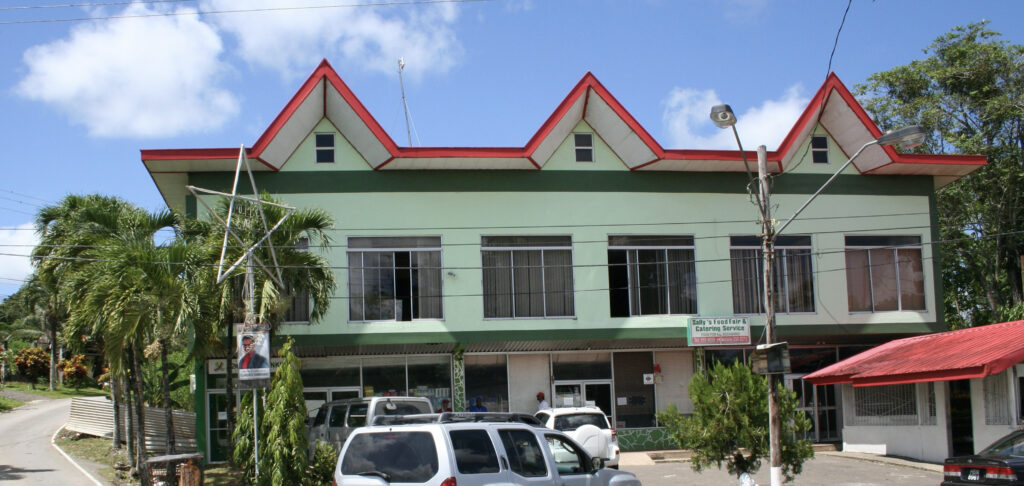
Her birth name is Sakina Mustapha and she was born February 23, 1945, in San Juan, Trinidad, a small community at the time. San Juan sits just south-east of the costal city facing the Caribbean Sea, Port of Spain, the capital. Today, like most communities situated around the urban hub, it is difficult to distinguish where one place ends and another begins, as you travel the Eastern Main Road west from Arouca, through Trincity, St. Augustine, San Juan, Port of Spain, to St. James. Biche, in the mountains, still remains relatively isolated and though Sally owns property in San Juan, Biche has been her home since the mid-60s.
I came to know a little about these places, Biche, San Juan, Port of Spain, by spending a week in Trinidad, travelling around and liming with Sally’s only son, Riaz. In the 1990s, Kelsey became close friends with a Trini neighbour in Mississauga, Baba Gajadharsingh. When Kelsey’s first marriage ended, Baba told him there was only one sure cure — and took him to Trinidad for Carnival. Immediately hooked by the people and their culture, Kelsey has since frequented Trinidad with Baba for nearly a quarter-century. Baba, who is related to Sally through marriage, had become very close to Riaz during a time when the two of them lived and worked in Fort McMurray, Alberta. Their closeness, in turn, embraced Kelsey and, as he said to me, “when I met Sally for the first time, I felt like I had known her for years. If I could sum it up, her attitude is ‘Riaz knows Kelsey so that’s that.’ No need to waste time on small talk. You are invited into her life immediately.”
When planning another visit to Trinidad with Baba in 2017, Kelsey asked if I would like to tag along — I’m not sure but I may have answered yes before he actually finished his sentence. If you don’t know the Trini meaning of the word lime, let me explain: it is a social gathering of friends centred around food, yet more. By more, I mean it envelops a way of living, an enjoyment of life that creates a relaxation you feel deep down. Sometimes a lime is well planned, other times it comes together at the drop of a hat, but regardless, it never disappoints because its promise is simple — enjoy your life today, you’re with friends, you have in front of you the best food skilled hands can create, so what more could you possible want.
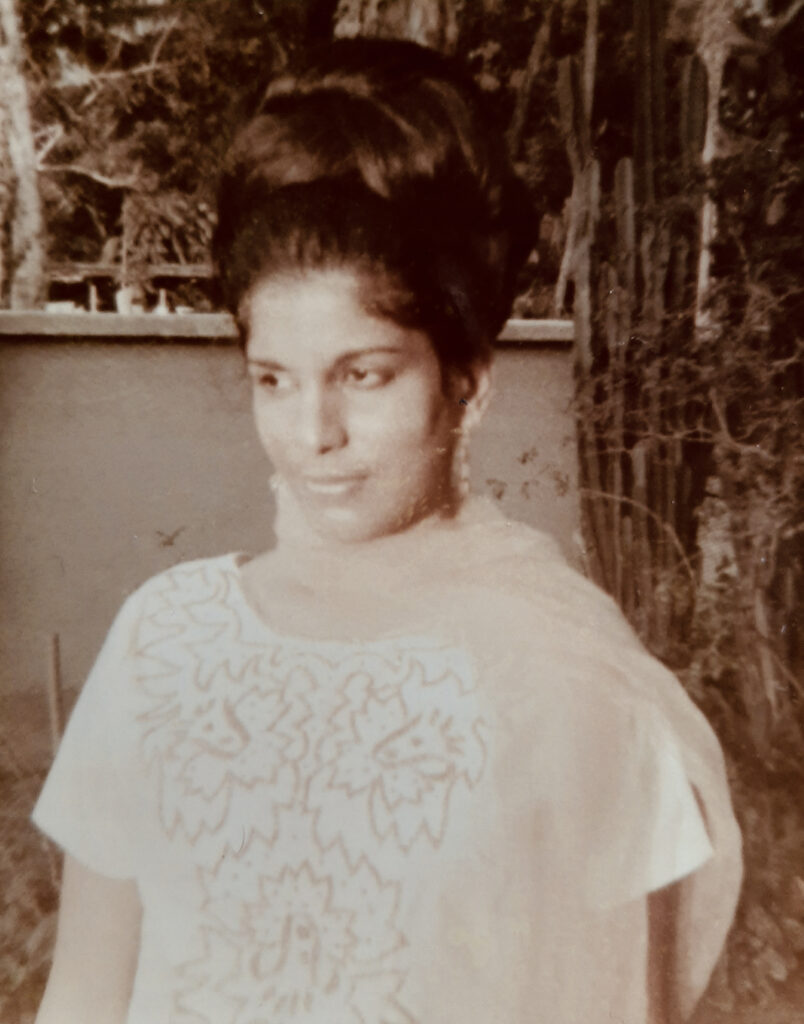
That’s how I came to Trinidad. As for Sally, well her family first arrived in the Caribbean in 1848, her great grandfather travelling from India to the Island of Nevis to work on a plantation. Ten years later he moved to Trinidad and settled in St. James. After working another five years on a sugar plantation, he moved to San Juan and purchased a farm — known in Trinidad as an estate — where he grew sugar cane, coconuts and rice, as well as raising cattle and donkeys that he exported to Venezuela. This industriousness and entrepreneurship would eventually show itself in his great granddaughter, after rippling through the entire family.
Zianool Mustapha, Sally’s father, worked as an office clerk at British West Indian Airways during the years of the Second World War until he’d saved enough to purchase five acres of land in Santa Cruz, growing vegetables, oranges and mangoes and raising everything from goats, to chickens, ducks and turkeys. He’d already built a family home in San Juan with his wife, Ziatoon, where Sally was born, one of eight children — five girls born first, followed by the boys. While her father worked the estate in Santa Cruz, she and her siblings helped their mother raise more chickens and ducks at the family home. Sally’s life was busy from the beginning. She attended school, was expected to help with the cooking, gather eggs twice a day and, when the fowl became dinner, tend to the plucking and cleaning. “I loved learning to cook as a girl” she told me, “but I did not enjoy the plucking and cleaning!” Ah well, raised in Trinidad in the ’50s and ’60s, you didn’t get to choose your household chores — being the second born brought family duty. The cooking skills she enjoyed became a life-long passion and, somewhere along the way, with all the schooling and household chores, Sally managed to learn to play cricket, a game she fell in love with.
In regards to love, beyond any games, she met Faiz Khan in 1965 when a cousin arranged for their introduction at a local fair. Faiz worked with his father on their estate in the mountains, growing cocoa, coffee and bananas. Sally and Faiz married a year later and true love it must have been because she followed her husband to Biche, a village of 1500 people which, at the time, consisted of only gravel roads beyond the main highway, two small grocery shops, and one gas station. No restaurants, no clothing stores and, most significantly, no electricity. Lighting provided by kerosene, the stove and refrigerator both propane, and the steam iron heated the old fashion way. Also notable, this is when she became known as Sally. For whatever reason, none of her in-laws could remember the name Sakina so they began calling her Sally, by which she has been known for fifty years, the name that adorns her restaurant: Sally’s Food Fair & Catering Service.
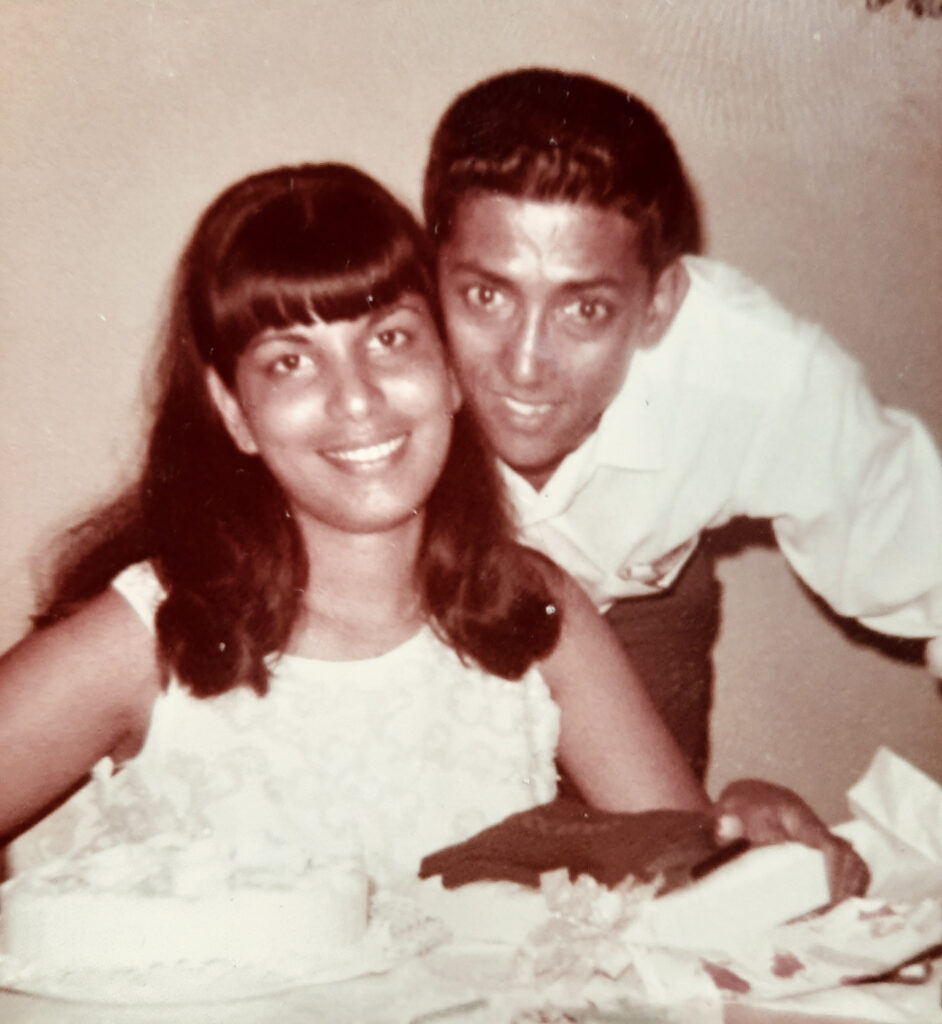
Although she knew what she was getting into before moving to Biche, Sally readily admits the transition was difficult, especially during the hottest days in the mountains, so far away from the sea breeze — forget air conditioning, without electricity there weren’t even fans. For the first few years she travelled home to San Juan as often as possible but, in 1970, pregnant with her second child, Fanzillah, Sally took more control of her life. She realized that all the locals had to go to Sangre Grande to buy baby clothes, almost an hour by car on twisting, poorly maintained mountain roads snaking through the tropical rain forest. The idea to begin her first of many businesses was born with her child. Sally approached her mother-in-law, who had the same name as her own mother, about taking a corner in her shop. Ziatoon agreed and Sally opened her first business, selling baby clothes. On a visit back home in San Juan, one of her sister’s husbands took her to Port of Spain and taught her how to buy wholesale, an early lesson in her growing business acumen. By this time, electricity had come to Biche. Six years later Sally and Faiz bought a wood structured commercial building from a family who’d operated a general store. Originally from China, the family decided to emigrate to Canada. Sally oversaw renovations and within the year expanded the building, selling furniture and appliances along with the other goods, obtained an agreement with Bata shoes to become a distributor, and put her cooking skills to use with a small cafeteria. By 1982, the original wood building came down and in it’s place she and Faiz erected the two storey concrete structure that stands today, where they continue to live and she operates retail and restaurant.
Let’s not fail to mention that during this time she gave birth to two more children, daughters Fazia and Ferial. I’m unsure of the location of the well from where she draws her energy, but establishing all those businesses and raising four children did not stop her from taking courses on clothing design and sewing. She then approached her father-in-law, Easu, with a business plan to purchase a number of commercial sewing machines which, in total, would cost 20,000 TTD (Trinidad Dollars). He asked how much Sally had saved and she said 10,000 TTD. I assume he understood that only success could emanate from her unrelenting, entrepreneurial verve, and he agreed to match her savings. Sally became not just a custom dress maker for women in Biche and the surrounding area, including bridal dresses, but she also secured a contract with a large outfit in Port of Spain to stitch and package sheets and pillow cases for retail sale. That woman’s day began at 4:30 in the morning when she arose to start the take-out breakfasts that the local workers would purchase on their way to their jobs on various estates, and didn’t end until 10 at night. That’s some energy; that’s some woman.
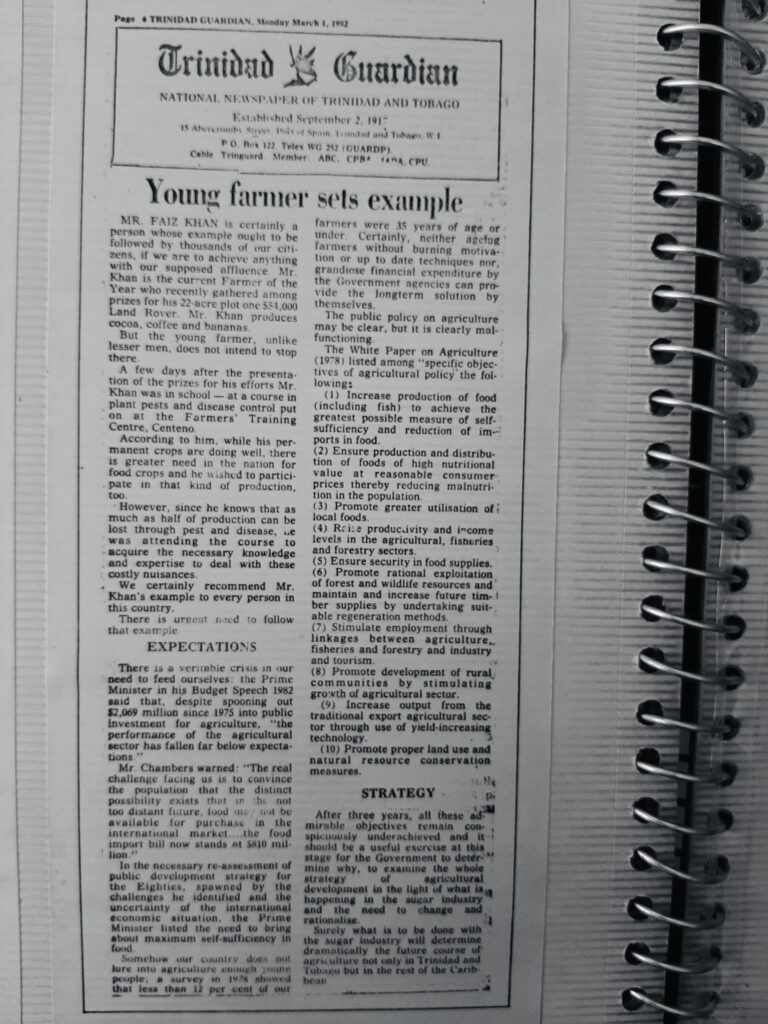
So that you don’t think Sally married a slouch, Faiz took over running his father’s estate and increased quality, especially of the cocoa they grew, to the point the estate became recognized both nationally and internationally. For nine years in a row, from 1974 to 1982, Faiz received the Champion’s Award as the best regional farmer. In 1978, he won an all-inclusive trip to Tobago as national farmer of the year and that honour was bestowed upon him again in 1982. That year the Minister of Agriculture personally recognized him with the Trinidad and Tobago award that came with a brand new Land Rover. Trinidad cocoa is known as some of the finest in the world and Faiz’s recognition brought interest from one of the largest chocolate companies: Hershey. They offered Faiz a job with their Pennsylvania research team to assist them in developing world-class cocoa trees. Their plan was to cultivate superior cocoa trees to grow in California. But to leave Trinidad meant abandoning the estate which his father required him to run. After declining the first time, Hershey came back with a sweetened offer (sorry, couldn’t resist the pun), but again Faiz declined and he and Sally stayed in Biche to raise their family.
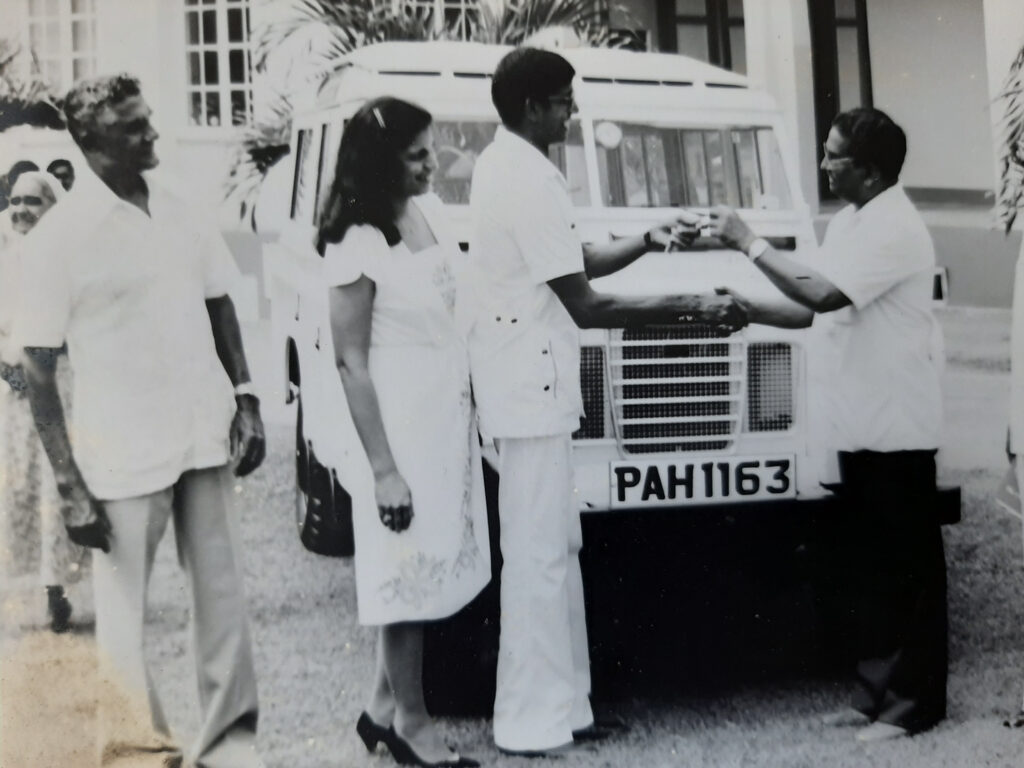
When Sally spoke to me about this decision, I detected a wistfulness in her voice regarding what might have been, to experience life in another country, to establish and succeed in a new place. With being so busy, her only travel with Faiz had been to Canada and once, without Faiz, she went on a European tour. It’s hard for me to imagine them anywhere but Biche, although I must say it would have been interesting to see what Sally would have done in middle America. Of all her cooking, she’s most known for her fabulous fried chicken. Who knows, if the Khan’s had re-established in America, maybe that Kentucky Colonel would have ended up playing second fiddle to Sally’s Famous Chicken.
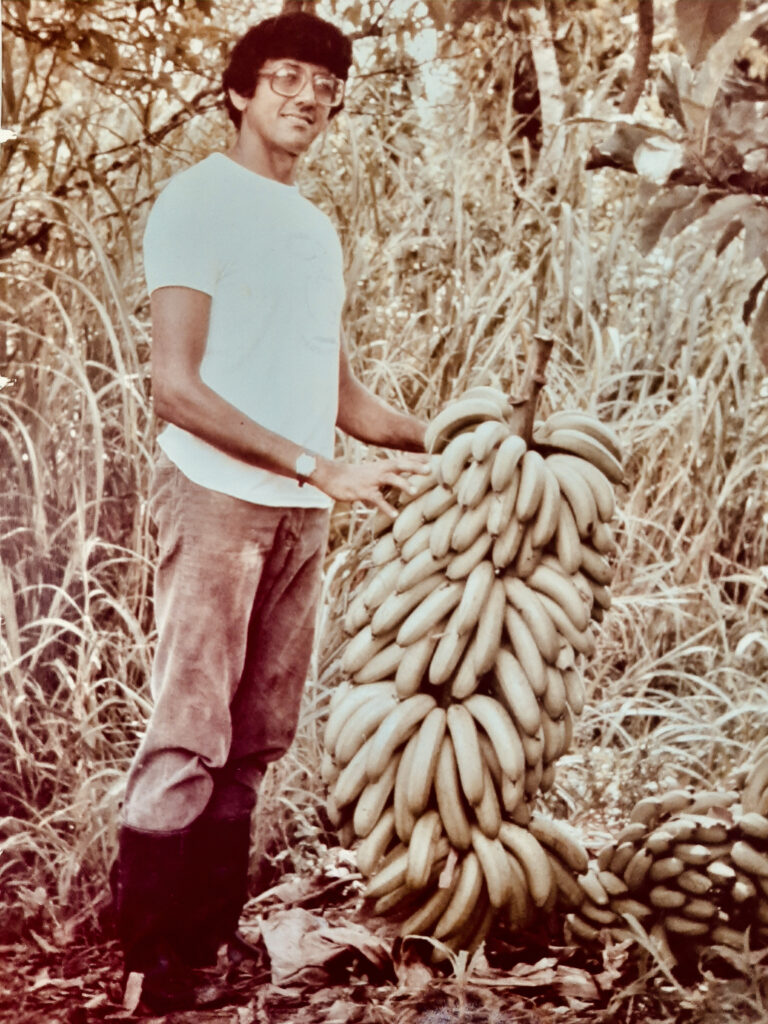
As I noted earlier, food is central to Trini culture, something that Baba emphasizes by saying, “If politics is the great divider, food is the great uniter.” To which he added, “And Sally knows this. She understands it.” When I asked Baba about this magnetic draw that Sally possesses, he pointed to her considerable culinary skills and said, “Sally draws a certain delight and personal satisfaction when people enjoy her cooking. Not only that, she is happy to share her recipes and demonstrate her secret methods.” He reflected on a private conversation they had a few years ago. She was telling him of the return of her cancer, and talked about the prospect of her being unable to run the restaurant any longer. Baba said she expressed a deep concern about all her customers, both the students and the workers who counted on her for breakfast first thing in the morning as they headed off to school and work. The sadness in her voice was unmistakable. In the midst of her personal strife, she didn’t muse about money, about potential loss of income, but about not being able to serve her customers and her community as she had for so many years. “At that moment,” Baba said, “I got a new respect because I never saw a businessperson who valued their customers in such a deep, caring and unselfish way.”

Through more than fifty years Sally has served her community by opening new businesses, providing baby clothes, furniture and appliances, custom made dresses, so the local people didn’t have to travel for their needs. She’s also been active in the community as volunteer and leader. In Trinidad, Carnival is the gigantic celebration just before Lent, a celebration that is famously known by different names in different places — in New Orleans it’s called Fat Tuesday and Mardi Gras. (In Toronto, we get an off-season taste of it in the summer with Caribana, now called the Toronto Caribbean Carnival.) Communities across Trinidad compete annually to win regional Carnival events for the best costumes so that they can represent at the island’s most important celebration. For years, Sally volunteered to lead the all important costume making. In addition, watching her father-in-law organize and sponsor men’s sporting organizations when she arrived in his home, Sally recalled her schoolgirl passion for cricket and went on to create the first female sports league in Biche, as both sponsor and administrator.
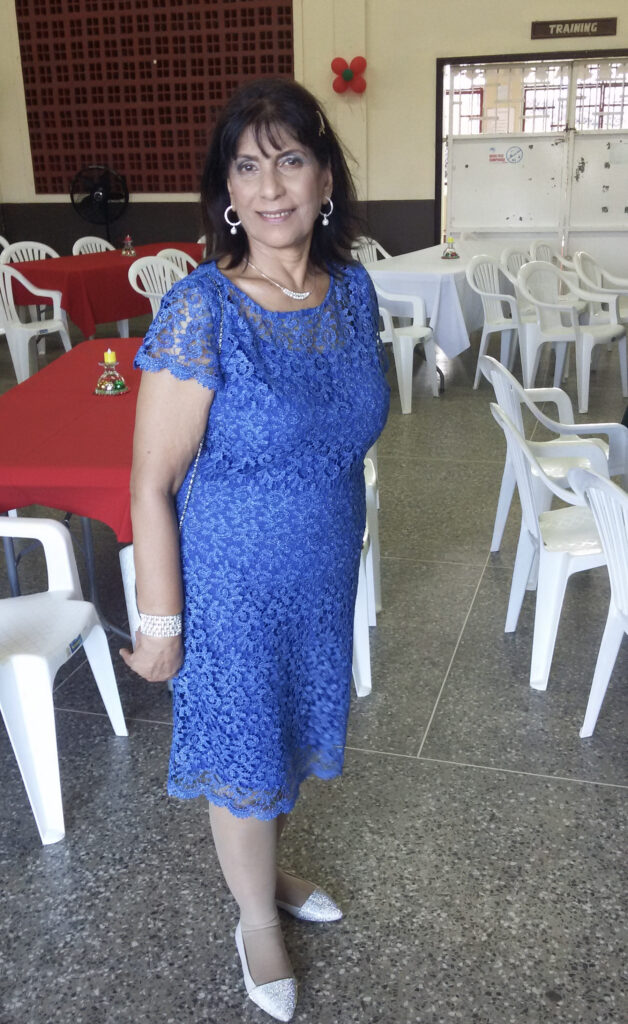
Beyond all that amazing, abundant energy, I think what creates Sally’s allure is her calmness. That and a social ease which draws in everyone around her, makes them instantly comfortable. Centred, Sally is, knowing herself, confident in her skills, her abilities, and most of all, her convictions. I came to understand the depth of her convictions when she related an awful, terrifying story.
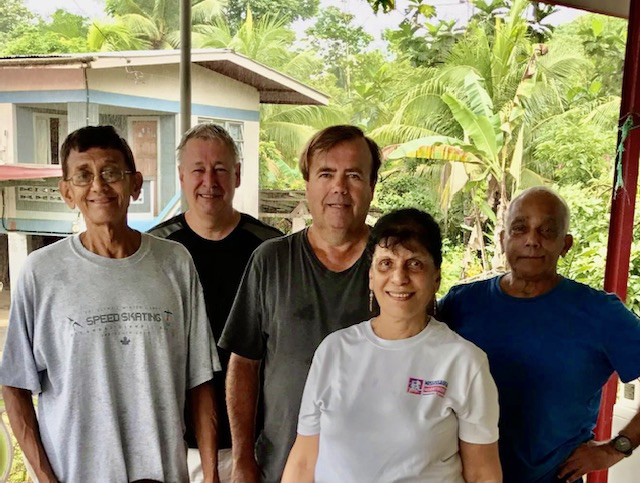
One night in 1997, after visiting family at the old house in San Juan, she hired a taxi to take her back to Biche. When the driver stopped at a corner, two men jumped into the car, one carrying a bag. The driver protested, telling them he already had a customer, but they told him to get out. When he refused, the guy with the bag pulled a gun from it and they hijacked the taxi, Sally still in the back seat. She imagined herself being driven out to the country, raped, and instantly decided that her fate belonged to her, she would be in control. Hopeless to overpower the hijackers she risked death at her own hands by flinging open the door and leaping out from the moving car. Her life her own, and she refused to succumb to the violence of others, even if that refusal brought her death through her actions — which, obviously and thankfully, it did not.
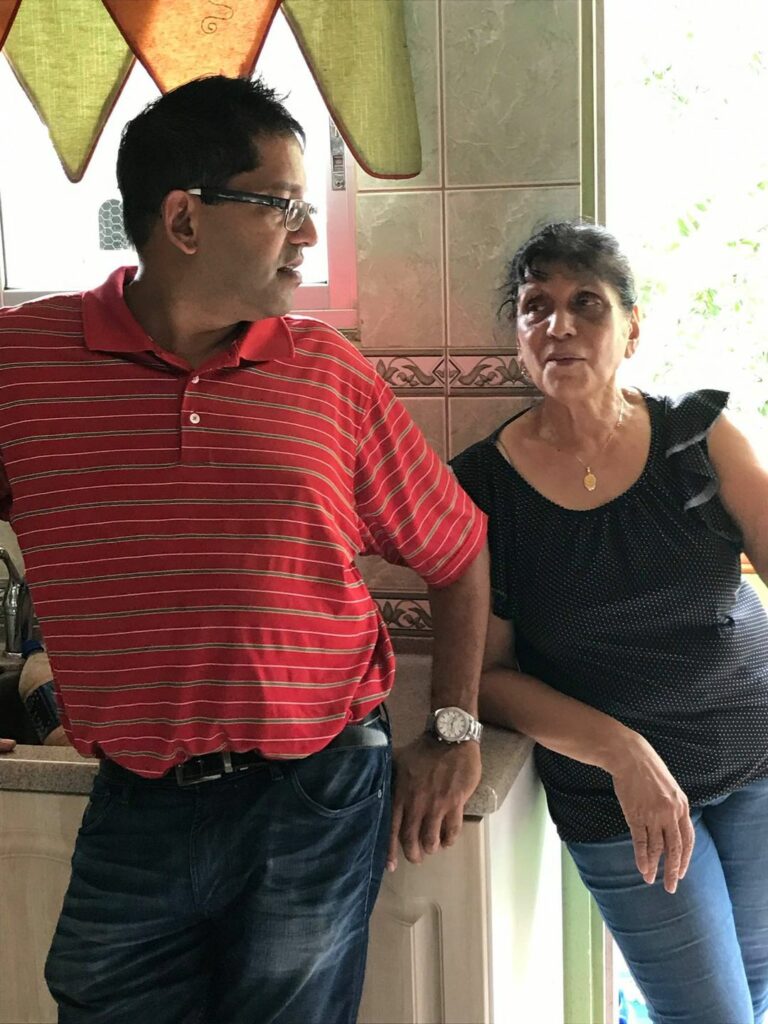
Wrapping up a phone call with Riaz one day recently, to confirm a few details, he told me as soon as the pandemic ended, and normal air travel resumed, I had to come back to Trinidad with Kelsey and Baba. Another week of liming, he said, and I imagined re-connecting with his many friends at their favourite spots: Johnny, Salick, Ivan, cooking a feast at Eddie Hart’s Ranch, or Robin’s beach house on Gaspar Grande Island. I know I’ll certainly enjoy more than a few Carib and Stag, the local beers, and chilling outdoors eating exquisite food. But for all that, what I most look forward to is spending a night in a small mountain village surrounded by rain forest, seated at a long dining table, playing Rummy 500 with Sally, game after game after game. What can I tell you: there’s just something about Sally.
In the next Profile you’ll meet Leo Lubrano, a wonderful soul who Barb & I came to know in Santa Monica. Originally from Long Island, Leo now lives in Venice, California, where he’s thriving even in the midst of this pandemic. With Leo’s story you’ll come to know a little about his unique business, working with major Hollywood studios and production companies creating visually dynamic installations for press junkets and events. Along the way, that business allowed him to meet a woman who grew up in his grandfather’s neighbourhood back in Italy: Sophia Loren.
I hope you come back.
2 Comments
Add comment Cancel reply
This site uses Akismet to reduce spam. Learn how your comment data is processed.
Both Peter and I have great memories of Sally playing cards and enjoying her delicious cooking. She love shopping and always willing to share great times with Candice and Joel.
Thanks for the feedback. I’m glad to see your memories of Sally are similar to mine though you surely know her much better than I do.